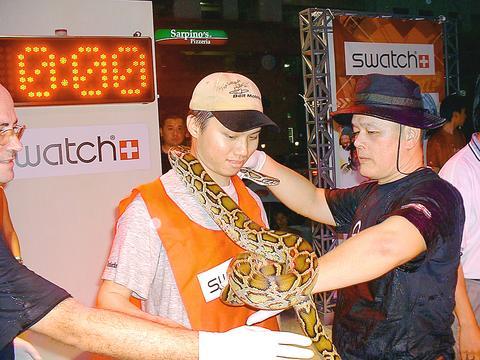Have you got what it takes to put your head into a tank filled with rats, cockroaches and snakes? Could you stomach eating a pizza topped with sheep's eyeballs and raw pig intestines?
If so, then AXN Taiwan wants to hear from you and participate in the AXN Fear Challenge 2003. Based on the popular US TV game show, Fear Factor, a show that is hugely popular with Taiwan audiences and boasts viewing figures of 0.4 percent of the population, the Fear Challenge 2003 is the first such event to be held in Greater China. Previous spin-off contests have been held in South Africa, Malaysia and India, where they proved hugely successful.
The contest proved so popular in India, in fact, that the initial two-day event was developed into a six-part TV show. While AXN Taiwan has no intention of serializing its Fear Challenge, the company has been inundated with far more applications than initially anticipated. Since the company began accepting applications a couple of weeks ago, almost 400 people have already asked to participate in the event, 18 percent of whom are women.

PHOTO COURTESY OF AXN TAIWAN
As there are only 20 places, the number of wannabe fearless folk will be whittled down at a special mild-fear challenge knockout contest on Nov. 30. Here the contestants will be asked to participate in some less-challenging Fear Factor-styled events as well as undergoing a screen test to ensure that they have what it takes to appear on national TV.
The first knockout heat of the AXN-organized and Taipei City Government-sponsored event will take place at two venues in Taipei, on Dec. 6 and 7. Those lucky, or unlucky, enough to have been chosen will be asked to do some stomach turning, inane and possibly life-threatening stunts which include bungy jumping in the Core Pacific Mall (
The final will take place on Dec. 20 in the parking lot opposite the Neo 19 shopping mall in the Xinyi District. While AXN is remaining tight lipped about the stunts the six finalists will have to undergo, according to AXN's Sofia Ong (
AXN is also hoping to play host to a special celebrity Fear Challenge on Dec. 20 and has invited several of the nation's most prominent legislators to take part in the one-off contest. Of those asked, however, none has yet accepted the open invitation to look witless on national TV.
Those fearless enough to wish to participate in the AXN Fear Challenge 2003 should log on to http://www.axn-taiwan.com and follow the instructions given. While AXN is encouraging Taiwan's foreign residents to apply, the Web site and application process are both in Chinese and a moderate level of Chinese-language ability is required for participation. Contestants have to be over 18 and applications must arrive before Nov. 29.

April 14 to April 20 In March 1947, Sising Katadrepan urged the government to drop the “high mountain people” (高山族) designation for Indigenous Taiwanese and refer to them as “Taiwan people” (台灣族). He considered the term derogatory, arguing that it made them sound like animals. The Taiwan Provincial Government agreed to stop using the term, stating that Indigenous Taiwanese suffered all sorts of discrimination and oppression under the Japanese and were forced to live in the mountains as outsiders to society. Now, under the new regime, they would be seen as equals, thus they should be henceforth

Last week, the the National Immigration Agency (NIA) told the legislature that more than 10,000 naturalized Taiwanese citizens from the People’s Republic of China (PRC) risked having their citizenship revoked if they failed to provide proof that they had renounced their Chinese household registration within the next three months. Renunciation is required under the Act Governing Relations Between the People of the Taiwan Area and the Mainland Area (臺灣地區與大陸地區人民關係條例), as amended in 2004, though it was only a legal requirement after 2000. Prior to that, it had been only an administrative requirement since the Nationality Act (國籍法) was established in

Three big changes have transformed the landscape of Taiwan’s local patronage factions: Increasing Democratic Progressive Party (DPP) involvement, rising new factions and the Chinese Nationalist Party’s (KMT) significantly weakened control. GREEN FACTIONS It is said that “south of the Zhuoshui River (濁水溪), there is no blue-green divide,” meaning that from Yunlin County south there is no difference between KMT and DPP politicians. This is not always true, but there is more than a grain of truth to it. Traditionally, DPP factions are viewed as national entities, with their primary function to secure plum positions in the party and government. This is not unusual

US President Donald Trump’s bid to take back control of the Panama Canal has put his counterpart Jose Raul Mulino in a difficult position and revived fears in the Central American country that US military bases will return. After Trump vowed to reclaim the interoceanic waterway from Chinese influence, US Defense Secretary Pete Hegseth signed an agreement with the Mulino administration last week for the US to deploy troops in areas adjacent to the canal. For more than two decades, after handing over control of the strategically vital waterway to Panama in 1999 and dismantling the bases that protected it, Washington has